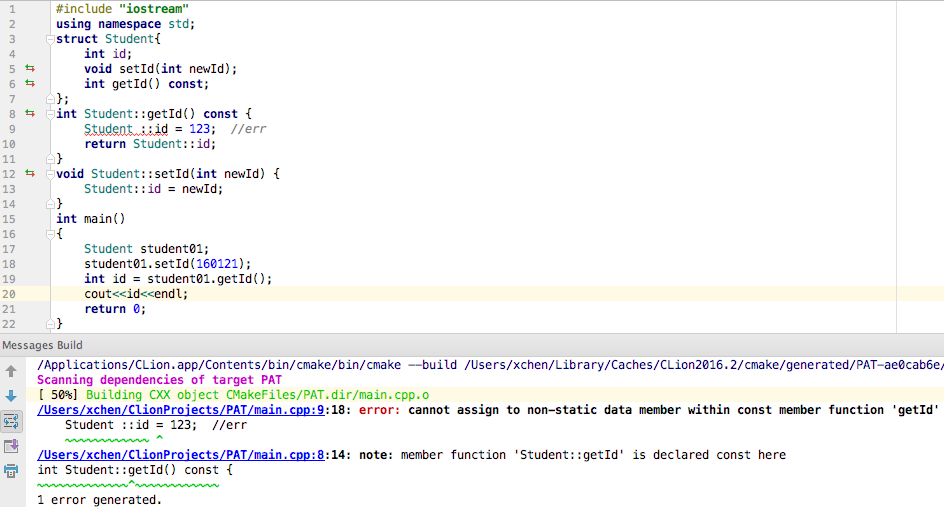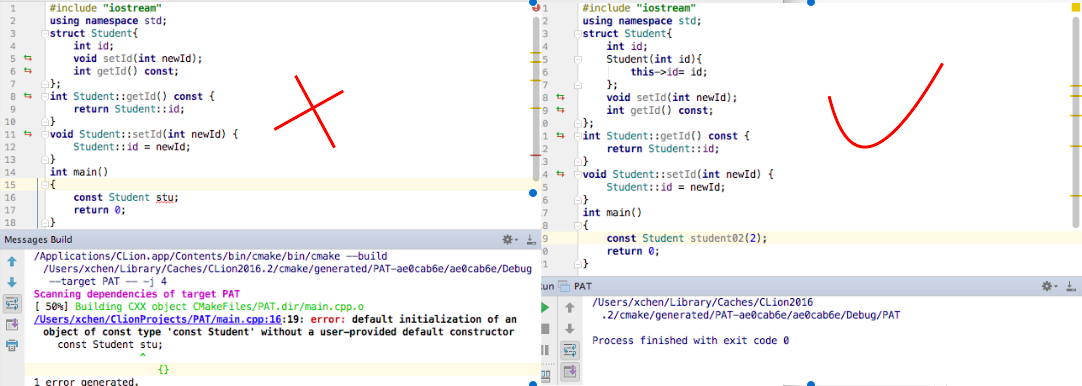做各种C++的测试题的时候,最害怕遇到const,const在C++中的用法非常多,慢慢总结一下。
一、常成员函数(const成员函数)
类中的成员函数声明为const,是告诉编译器本函数不会改变调用它的对象的内容。
1)const成员函数的声明与定义
常成员函数的声明格式:<类型说明符> <函数名> <(参数表)> const;
在类体之外定义const成员函数时,也要在函数的参数表后面加上关键字const。
#include "iostream"
using namespace std;
struct Student{
int id;
void setId(int newId);
int getId() const;
};
int Student::getId() const {
return Student::id;
}
void Student::setId(int newId) {
Student::id = newId;
}
int main()
{
Student student01;
student01.setId(160121);
int id = student01.getId();
cout<<id<<endl;
return 0;
}2)const成员函数不能修改成员数据
const成员函数不能修改类对象中的成员数据(指针除外)。
3)类的const成员函数可以被非const成员函数重载
参考:http://blog.csdn.net/lihao21/article/details/8634876
4)mutable
C++11中定义了mutable关键字,如果我们定义一个了一个const成员函数,但是在某些场景下,我们还是希望能够修改成员数据,那么我们将数据成员声明为mutable,这样不管const成员函数还是非const成员函数都可以修改该数据成员了。
二、const类对象
非const类对象既可以访问const成员函数也可以访问非const成员函数,const类对象只能访问const成员函数
1)定义与声明
const类对象声明格式:const <类型说明符> <对象名> ;
由于const类对象不能对成员数据进行修改,因此在声明的时候,必须对成员数据通过类构造函数进行初始化。
2)const对象只能访问const成员函数
#include "iostream"
using namespace std;
struct Student{
int id;
Student(int id){
this->id= id;
};
void setId(int newId);
int getId() const;
};
int Student::getId() const {
return Student::id;
}
void Student::setId(int newId) {
Student::id = newId;
}
int main()
{
Student student01(1);
student01.setId(3);
cout<<student01.getId()<<endl;
const Student student02(2);
//st.setId(4); //err const类对象不能调用非const成员函数
cout<<student02.getId()<<endl;
return 0;
}























 2824
2824

 被折叠的 条评论
为什么被折叠?
被折叠的 条评论
为什么被折叠?








